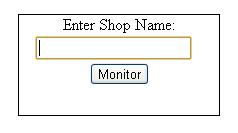Running The Application If you run the application you will be present with a log in screen (below), where you just enter a unique name - the name is not validated here - but that is something that can be easy implemented - all we are after is a unique name that can be later used to indicate who pushed a an update from the client on the GUI. 
Once logged into the application, the main screen will be display. It contains a grid, with cell foreground colors converted, based on their cell values. A number of gauges, are displayed below the grid, that reflect the values within the grid itself. Below the gauges, is a textbox and button to update the 'Fan' gauge (push the value to the server and then onto each connected session). At the bottom is a textblock that will display all the transactions from other stores\users or auto generated by the server and pushed to all the clients. ...
...Code Explanation
Client (Silverlight) Codenamespace Client
{
[ScriptableType]
public partial class ClientPage : Page
{
private ObservableCollection<ThermoTemps> thermoCollection;
public ClientPage()
{
InitializeComponent();
ThermoCollection = new ObservableCollection<ThermoTemps>();
this.gridThermo.ItemsSource = ThermoCollection;
HtmlPage.RegisterScriptableObject("myObject", this);
} private void button1_Click(object sender, RoutedEventArgs e)
{
HtmlPage.Window.Invoke("sendMessage", this.txtFan.Text);
} [ScriptableMember]
public void UpdateText(string result)
{
try
{
string jsonString = result.Substring(result.IndexOf('{'));
ThermoTemps myDeserializedObj = new ThermoTemps(); DataContractJsonSerializer dataContractJsonSerializer = new DataContractJsonSerializer(typeof(ThermoTemps));
MemoryStream memoryStream = new MemoryStream(Encoding.Unicode.GetBytes(jsonString));
myDeserializedObj = (ThermoTemps)dataContractJsonSerializer.ReadObject(memoryStream);
ThermoCollection.Add(myDeserializedObj);Read more: Codeproject
QR:
...Code Explanation
Client (Silverlight) Codenamespace Client
{
[ScriptableType]
public partial class ClientPage : Page
{
private ObservableCollection<ThermoTemps> thermoCollection;
public ClientPage()
{
InitializeComponent();
ThermoCollection = new ObservableCollection<ThermoTemps>();
this.gridThermo.ItemsSource = ThermoCollection;
HtmlPage.RegisterScriptableObject("myObject", this);
} private void button1_Click(object sender, RoutedEventArgs e)
{
HtmlPage.Window.Invoke("sendMessage", this.txtFan.Text);
} [ScriptableMember]
public void UpdateText(string result)
{
try
{
string jsonString = result.Substring(result.IndexOf('{'));
ThermoTemps myDeserializedObj = new ThermoTemps(); DataContractJsonSerializer dataContractJsonSerializer = new DataContractJsonSerializer(typeof(ThermoTemps));
MemoryStream memoryStream = new MemoryStream(Encoding.Unicode.GetBytes(jsonString));
myDeserializedObj = (ThermoTemps)dataContractJsonSerializer.ReadObject(memoryStream);
ThermoCollection.Add(myDeserializedObj);Read more: Codeproject
QR: